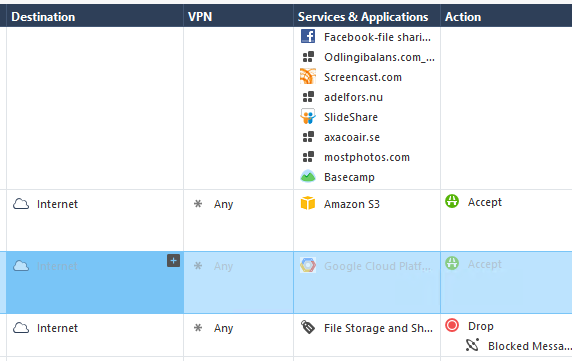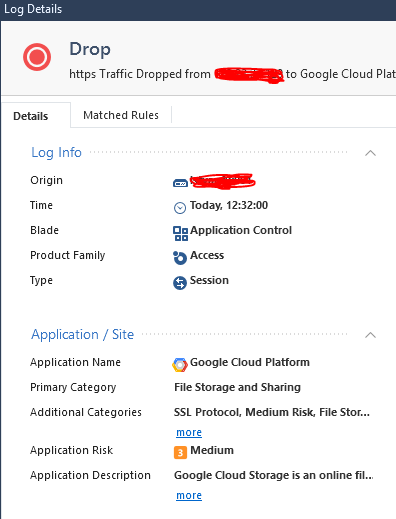- Products
Network & SASE IoT Protect Maestro Management OpenTelemetry/Skyline Remote Access VPN SASE SD-WAN Security Gateways SmartMove Smart-1 Cloud SMB Gateways (Spark) Threat PreventionCloud Cloud Network Security CloudMates General CloudGuard - WAF Talking Cloud Podcast Weekly ReportsSecurity Operations Events External Risk Management Incident Response Infinity AI Infinity Portal NDR Playblocks SOC XDR/XPR Threat Exposure Management
- Learn
- Local User Groups
- Partners
- More
This website uses Cookies. Click Accept to agree to our website's cookie use as described in our Privacy Policy. Click Preferences to customize your cookie settings.
- Products
- AI Security
- Developers & More
- Check Point Trivia
- CheckMates Toolbox
- General Topics
- Products Announcements
- Threat Prevention Blog
- Upcoming Events
- Americas
- EMEA
- Czech Republic and Slovakia
- Denmark
- Netherlands
- Germany
- Sweden
- United Kingdom and Ireland
- France
- Spain
- Norway
- Ukraine
- Baltics and Finland
- Greece
- Portugal
- Austria
- Kazakhstan and CIS
- Switzerland
- Romania
- Turkey
- Belarus
- Belgium & Luxembourg
- Russia
- Poland
- Georgia
- DACH - Germany, Austria and Switzerland
- Iberia
- Africa
- Adriatics Region
- Eastern Africa
- Israel
- Nordics
- Middle East and Africa
- Balkans
- Italy
- Bulgaria
- Cyprus
- APAC
CheckMates Fest 2026
Join the Celebration!
AI Security Masters
E1: How AI is Reshaping Our World
MVP 2026: Submissions
Are Now Open!
What's New in R82.10?
Watch NowOverlap in Security Validation
Help us to understand your needs better
CheckMates Go:
Maestro Madness
Turn on suggestions
Auto-suggest helps you quickly narrow down your search results by suggesting possible matches as you type.
Showing results for
- CheckMates
- :
- Products
- :
- Network & SASE
- :
- Management
- :
- Re: How to handle possibly false positive in appli...
Options
- Subscribe to RSS Feed
- Mark Topic as New
- Mark Topic as Read
- Float this Topic for Current User
- Bookmark
- Subscribe
- Mute
- Printer Friendly Page
Turn on suggestions
Auto-suggest helps you quickly narrow down your search results by suggesting possible matches as you type.
Showing results for
Are you a member of CheckMates?
×
Sign in with your Check Point UserCenter/PartnerMap account to access more great content and get a chance to win some Apple AirPods! If you don't have an account, create one now for free!
- Mark as New
- Bookmark
- Subscribe
- Mute
- Subscribe to RSS Feed
- Permalink
- Report Inappropriate Content
How to handle possibly false positive in application control?
A customer user has problems downloading files from Basecamp, which is a file-sharing application. We have an excplicit allow for this application in the policy but generally don't allow file sharing, as you can see in the policy snippet. When the user tries to download a file from Basecamp they can't. The drop log seems to point to Google Cloud Platform. I myself don't have an account at this basecamp site but when I go to the URL i face an Google-log in prompt. Seems Google is used as authenticating part here. Could this be the reason for the miss-classification?
Not sure how to solve this, without activating the disabled rule below, which allows downloads from Google Cloud Platform. The customer doesn't use Identity Awareness because of issues with AD. So allowing only this one user downloads from all google cloud is not possible either. Should I report this as an error in CheckPoint interpretation or am I getting it wrong?


- Tags:
- applicationcontrol
15 Replies
- Mark as New
- Bookmark
- Subscribe
- Mute
- Subscribe to RSS Feed
- Permalink
- Report Inappropriate Content
I face these kinds of issues frequently with App Control. It gets trickier and trickier to keep things locked down when sites like Google and Facebook use their authentication solutions to authenticate other 3rd party sites. You could try opening a ticket with TAC, but my hunch is that it is seeing the Google Login integration as "Google Cloud Platform".
I've typically used Identity Awareness Roles as the means to get around these kinds of problems. I understand that won't work in your use case. You said its just one user? Would it be possible to give that user a Static IP or DHCP reservation and just create a separate rule for that IP to access Google Cloud Platform? Without IA, that is probably the quickest way to work around this without enabling Google Cloud access for everyone.
Hope this helps!
R80 CCSA / CCSE
- Mark as New
- Bookmark
- Subscribe
- Mute
- Subscribe to RSS Feed
- Permalink
- Report Inappropriate Content
Ok! Thanks for confirming my suspicion. I thought about a static IP/reservation, but those actions are performed by another department (as always), so I just wanted to see what my options were before I request this lease. Of course there are drawbacks with this as well since the user would only be able to access the service when they are at the local office. No branch sites or VPN would work. But it's clearly better than nothing. I hope they can sort out the AD issues so that we can run IA in the future. Would simplify things a notch.
Many thanks for the input!
- Mark as New
- Bookmark
- Subscribe
- Mute
- Subscribe to RSS Feed
- Permalink
- Report Inappropriate Content
Just a hint: Identity Collector is a good tool when AD query takes to much ressources.
CCSP - CCSE / CCTE / CTPS / CCME / CCSM Elite / SMB Specialist
- Mark as New
- Bookmark
- Subscribe
- Mute
- Subscribe to RSS Feed
- Permalink
- Report Inappropriate Content
Thanks Günther! Wasn't aware of IC. I'll present this for the customer team.
- Mark as New
- Bookmark
- Subscribe
- Mute
- Subscribe to RSS Feed
- Permalink
- Report Inappropriate Content
Ilmo Anttonen wrote:
The customer doesn't use Identity Awareness because of issues with AD.
Well, AD is not the only identity source for Identity Awareness.

You have a set of options you can choose from. As it's just for one customer user you should be able to use Browser-based Auth or an Identity Agent, or.. you see?
- Mark as New
- Bookmark
- Subscribe
- Mute
- Subscribe to RSS Feed
- Permalink
- Report Inappropriate Content
A TAC case probably wouldn't hurt here.
Note that if you're not using HTTPS Inspection, some applications may be viewed as something you don't expect or something generic like Google.
This is because Google especially uses wildcard certificates for many of their services and, without seeing the exact URLs accessed, it's not always clear what is being accessed.
Yes, proper SNI support will help (and it's coming). ![]()
- Mark as New
- Bookmark
- Subscribe
- Mute
- Subscribe to RSS Feed
- Permalink
- Report Inappropriate Content
Proper SNI support is still not there ☹️
- Mark as New
- Bookmark
- Subscribe
- Mute
- Subscribe to RSS Feed
- Permalink
- Report Inappropriate Content
- Mark as New
- Bookmark
- Subscribe
- Mute
- Subscribe to RSS Feed
- Permalink
- Report Inappropriate Content
If the Certificate of the requested server is not trusted by the FW, the SNI is not evaluated. So if a porn site uses a CA like "Let's Encrypt" the FW will probably not block the HTTPS traffic, depending on when the key store was last updated. (example s e x.de)
- Mark as New
- Bookmark
- Subscribe
- Mute
- Subscribe to RSS Feed
- Permalink
- Report Inappropriate Content
Is it a theory or a fact?
URL categorization will still work for that site. Also, in HTTPSi settings, you can turn on blocking sites with untrusted certs.
Either way, I believe your claim deserves a post in the community, instead of reviving 3 year old discussion.
- Mark as New
- Bookmark
- Subscribe
- Mute
- Subscribe to RSS Feed
- Permalink
- Report Inappropriate Content
Sorry about the old Thread.
Yes I should start a new Thread about that. Which I was planing to do anyway. But when I read your statement I got carried away...
And i think it is fact since I got the TAC Case to prove it with the R&D reply that this behavior is by design.
- Mark as New
- Bookmark
- Subscribe
- Mute
- Subscribe to RSS Feed
- Permalink
- Report Inappropriate Content
No need to be sorry. I was about to say, it is by design, but still, several things:
- You can add CAs at will, on top of those updatable by Check Point
- You can decide to block all sites with untrusted CAs.
Also, categorization is not totally based on SNI, so there might be some other ways.
- Mark as New
- Bookmark
- Subscribe
- Mute
- Subscribe to RSS Feed
- Permalink
- Report Inappropriate Content
Well it is the Design that gets me agitated ...
But we will discuss this in another (new) thread
- Mark as New
- Bookmark
- Subscribe
- Mute
- Subscribe to RSS Feed
- Permalink
- Report Inappropriate Content
Please do 🙂
- Mark as New
- Bookmark
- Subscribe
- Mute
- Subscribe to RSS Feed
- Permalink
- Report Inappropriate Content
Actually it's available as far back as R80.20 with the appropriate JHF.
Leaderboard
Epsum factorial non deposit quid pro quo hic escorol.
| User | Count |
|---|---|
| 22 | |
| 13 | |
| 13 | |
| 6 | |
| 5 | |
| 5 | |
| 5 | |
| 4 | |
| 4 | |
| 4 |
Upcoming Events
Thu 08 Jan 2026 @ 05:00 PM (CET)
AI Security Masters Session 1: How AI is Reshaping Our WorldThu 22 Jan 2026 @ 05:00 PM (CET)
AI Security Masters Session 2: Hacking with AI: The Dark Side of InnovationThu 12 Feb 2026 @ 05:00 PM (CET)
AI Security Masters Session 3: Exposing AI Vulnerabilities: CP<R> Latest Security FindingsThu 26 Feb 2026 @ 05:00 PM (CET)
AI Security Masters Session 4: Powering Prevention: The AI Driving Check Point’s ThreatCloudThu 08 Jan 2026 @ 05:00 PM (CET)
AI Security Masters Session 1: How AI is Reshaping Our WorldThu 22 Jan 2026 @ 05:00 PM (CET)
AI Security Masters Session 2: Hacking with AI: The Dark Side of InnovationThu 26 Feb 2026 @ 05:00 PM (CET)
AI Security Masters Session 4: Powering Prevention: The AI Driving Check Point’s ThreatCloudAbout CheckMates
Learn Check Point
Advanced Learning
YOU DESERVE THE BEST SECURITY
©1994-2025 Check Point Software Technologies Ltd. All rights reserved.
Copyright
Privacy Policy
About Us
UserCenter


